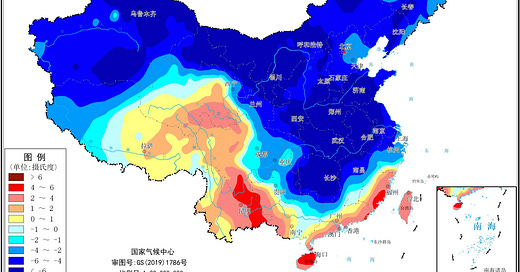China Breaks 400 Low Temperature Records; Record Snow Sweeps South Korea; Heavy Powder Pounds The Alps, A Lot More To Come; + AR3590 Now Rivals 'The Carrington' Sunspot
Shanghai experiences freezing rain for the first time it its 150+ years of meteorological records.
China Breaks 400 Low Temperature Records
Residents in the city of Shanghai have just endured their coldest late-February day for 43 years, since 1981.
Official thermometers read 2.2C (36F) in Xujiahui on Saturday as a rare blast of Arctic air engulfed the metropolis.
On Saturday morning, Shanghai experienced freezing rain for the first time in its 150+ years of meteorological records.
“The cold wave is coming and the roof of Shanghai Tower is covered in ice and snow!” — Jim Yang on X.
China's freeze has really been quite extensive, gripping far more than just Shanghai.
Below is a look at the central province of Hunan where freezing rains and heavy snows have also been the theme:
This is the story across China, and the record books show it.
Following last week's record-setting chill, which itself was preceded by blasts in late-Jan and early-Feb, another 400 stations have busted low temperature benchmarks for late-Feb (as of Sunday), with 29 of those also breaking lows for anytime in February.
China's Arctic Outbreak has been truly invasive, plunging historically-far south.
For a host of locales, this month will enter the books as the coldest February on record.
The AGW Party has been on 'damage limitation'—as you would expected—with those outlets daring to mention China's polar cold keenly attributing the country-wide extremes to 'prosperity in the West' (i.e. CO2 emissions).
This cold is not only setting records for the coldest daytime temperature in February but also serves as a stark contrast to the city's typically mild winter conditions. This event, as noted by local meteorological reports, highlights the increasing unpredictability of weather patterns, a likely consequence of broader climatic shifts being observed globally — bnnbreaking.com.
The data recorded at the Xujiahui station not only contributes to historical weather records but also serves as a crucial point of analysis for scientists and meteorologists trying to understand the changing climate dynamics.
As Shanghai thaws from its coldest late February day in over four decades, the event may well serve as a clarion call for greater environmental awareness and action, challenging residents and policymakers alike to consider the broader implications of climate change and the urgent need for sustainable living practices.
Agendas are standing in the way of the truth, at least in the West...
Winters in China have been warming for the past 6,000 years unrelated to human activity, so finds a study from a group of Chinese researchers. Looking ahead however, the scientists foretell of a sudden and severe flip to global cooling and they speak to the serious hardships and dangers such an episode will deliver.
Keep reading with a 7-day free trial
Subscribe to Electroverse Substack to keep reading this post and get 7 days of free access to the full post archives.




